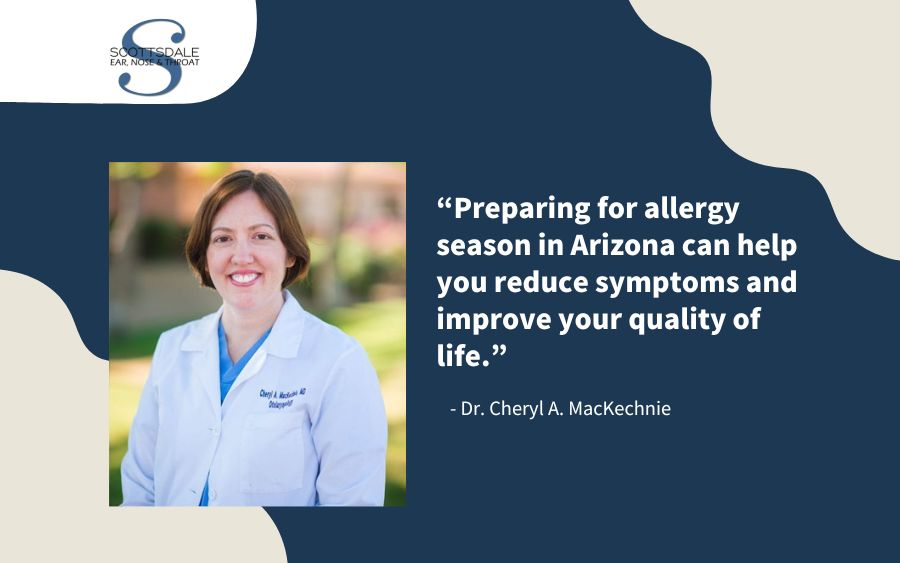While Arizona is a beautiful state with an arid climate and diverse landscapes, it’s also known for its high pollen counts and allergens that can cause discomfort and even serious health problems.
Allergy season in Arizona typically occurs in the spring and fall, but it can start as early as January and last until November, depending on which airborne pollen your body reacts to.
Allergies occur when your immune system overreacts to a foreign substance such as pollen, dust, or pet dander.
Air pollution can also irritate your respiratory system and exacerbate allergy symptoms if you’re in a highly populated area with traffic or industry.
Allergic responses can include:
- Sneezing
- Congested or runny nose
- Watery eyes
- Headaches
- Fatigue
- Itchy eyes, nose, or throat
More extreme symptoms include hives, rashes, or difficulty breathing, but the severity can vary from person to person and from one substance to another.
When Does Allergy Season Typically Occur in Arizona?
Arizona’s most-reported allergen is soy, but the most irritating appears to be ragweed.
Other relatively common allergy-inducing plants include:
- Tumbleweed
- Ryegrass
- Bermudagrass
- Mesquite trees
- Mulberry trees
- Olive trees
- Juniper trees
Some are more seasonal than others.
Arizona’s dry climate features frequent breezes, which allow plant pollen to travel easily. The year-round growing season also ensures there are always some plants producing pollen.
Having said that, Arizona’s allergy season varies with location and climate.
Spring (February to June) is typically the worst for allergy sufferers, with high pollen counts and windy conditions exacerbating symptoms. Heavily pollinating trees include ash, mesquite, mulberry, cottonwood, oak, and olive, while ragweed and grasses also pollinate in spring.
Summer tends to be less severe, with some grass and weed allergens remaining.
Fall (September to November) often sees another surge in pollination and is problematic due to the renewed presence of ragweed and other allergens, such as Russian thistle and grass.
Winter, however, usually sees weed, and grass allergies become less severe. Some tree species, such as juniper, can pollinate during the winter months, but winter is the safest season overall for allergies in Arizona.
Prevention and Management Strategies for Allergies in Arizona
Preparing for allergy season in Arizona can help you reduce symptoms and improve your quality of life.
Check the pollen count regularly and plan your outdoor activities in response.
Online tools such as Pollen.com or Pollen Pal provide information on the pollen levels in your area. Check pollen.com’s national allergy map or type your zip code into the Pollen Pal tool to get a local allergy outlook. These tools help you take necessary precautions to avoid allergic reactions.
Such precautions include:
- Keeping windows and doors closed
- Using air purifiers and HEPA filters to reduce indoor allergens
- Washing bedding and clothing regularly
A HEPA (High-Efficiency Particulate Air) filter removes 99.97% of small particles from the air with a mat of randomly arranged fibers. They’re commonly used in air purifiers, vacuum cleaners, and HVAC systems to improve indoor air quality and reduce allergy and respiratory illness risks.
You should also vacuum and dust often and take off your shoes and socks as soon as you get home: otherwise, you’ll track pollen everywhere.
Several prevention and management strategies can help alleviate allergy symptoms during allergy season in Arizona.
- Over-the-counter (OTC) antihistamines such as Claritin, Zyrtec, and Allegra can help reduce symptoms such as sneezing, a runny nose, and itchy eyes.
- Nasal corticosteroids such as Flonase and Nasacort can help reduce any inflammation in your nasal passages and improve your breathing.
- Decongestants such as Sudafed and Afrin should help relieve your congestion and improve your breathing.
- Eye drops help with itchy eyes by clearing your eyes of pollen.
- Natural remedies such as honey, probiotics, and vitamin C may also help reduce your allergy symptoms via desensitization, improved gut health, and anti-inflammation properties.
- Allergy shots, also known as immunotherapy, can help desensitize your immune system to allergens and reduce symptoms over time.
- Prescription medicines are a last resort if over-the-counter options aren’t working for you.
Be sure to speak with a healthcare provider before starting any medication to ensure it’s safe and effective for your needs.
That’s why we’re here! Scottsdale Ear, Nose & Throat (ENT) offers the very best physicians and support staff dedicated to providing you with an exceptional allergy relief experience.
If you’re unsure what allergens are causing your symptoms, we also offer an allergy test to help identify your specific triggers.
Where to Get an Allergy Test in Arizona
Our allergy test begins with swabbing the skin on your back with alcohol.
You’ll then feel minor pressure for a few seconds as we apply the first series of antigens to your skin. More tests are then applied in five different locations on your back.
As positive test results develop, there will be some discomfort and itching.
One of our Doctors of ENT will monitor the reactions every five minutes, so you’ll be safe. The results are typically available within 15 minutes after the last series of antigens is applied.
We then remove the antigens from your skin using alcohol wipes, review your test results with you, and discuss applicable treatment options.
Most insurance plans cover these allergy tests. In most cases, you will only be responsible for paying the co-pay and/or deductible required for a typical doctor’s visit.
We Can Help You Find Relief from Your Allergies in Arizona
Allergy season in Arizona can be challenging, but understanding common allergens, prevention and management strategies, and natural remedies can significantly reduce your symptoms and improve your quality of life.
Remember to check the local pollen count regularly, keep windows and doors closed, and consider getting an allergy test to identify your specific triggers.
If you’re concerned about allergies in Arizona this season, please schedule a consultation with one of our ENT experts in Scottsdale to receive relief this allergy season.
You can here or give us a call at (480) 684-1080. Prepare for allergy season in Arizona by scheduling an appointment today.



